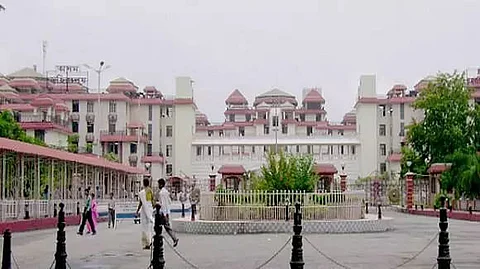
- Home
- Live Blog
- Breaking News
- Top Headlines
- Cities
- NE News
- Sentinel Media
- Sports
- Education
- Jobs

STAFF REPORTER
GUWAHATI: The Assam Government has constituted seven sub-groups/committees to suggest measures and recommendations to bring about overall futuristic development for indigenous Assamese Muslims living in the State.
The sub-groups or committees constituted by the Welfare of Minorities and Development Department on Saturday will undertake thorough studies on population stabilization, healthcare, cultural identity, education, financial inclusion, skill development and women empowerment of the indigenous Assamese Muslim community of the State. The sub-groups or committees comprising prominent indigenous Assamese Muslims from different walks of life as members and senior ACS officers as Member Secretary will submit their detailed reports and recommendations within three months for taking further necessary actions.
The Welfare of Minorities and Development Department has constituted the sub-groups or committees in pursuance of the decision taken during an official programme titled 'ALAAP- ALOCHANA: Empowering the Religious Minorities', which took place at the Assam Administrative Staff College at Khanapara here on July 4 this year. In the programme, Chief Minister Himanta Biswa Sarma interacted with over 150 prominent indigenous Muslims from diverse fields and assured them to bring about the overall development of the community.
The sub-group on population stabilization will be headed by Padmashree Dr Illias Ali. A former professor of BN College, Dhubri Akabor Ali Ahmed, Additional Superintendent of Tezpur Medical College & Hospital Dr Tanwir Alam and Journalist Sahabuddin Ahmed will be members of the committee. ACS officer KJ Hilaly will be the Member Secretary.
Anti-AIDS campaigner Dr Syed Iftikhar Ahmed will head the health committee. Dr Javed Ali and Dr Aftab Ali Ahmed will be members. ACS official Zahid Chistie will be the Member Secretary.
Journalist Wasbir Hussain will head the committee on cultural identity. Writer and poet Imran Hussain and film producer Nurul Sultan will be members. ACS officer Mahmud Hussain will be the Member Secretary.
The committee of education will be headed by Dr Adi lUl Yasin, a former professor of Dibrugarh University. ACS official Inamul Hussain will be the Member Secretary.
Retired IAS officer Nafifa Ahmed will be the chairperson of the committee on financial inclusion. Professor of Economics of Gauhati University Dr Nissar Ahmed Barua, retired joint director of Economics & Statistics department Safiur Rahman and deputy general manager of Assam Financial Corporation Fayek Azad will be the members. ACS officer Syed Ishfaqur Rahman will be the Member Secretary.
The committee on skill development will be headed by the head of the Mechanical Engineering department of Dibrugarh Polytechnic Mujibur Rahman. Entrepreneur Dr Nekib Hussain and Oil industry professor Md Rashid Arif Hussain will be the members. ACS officer Sazzad Alam will be the Member Secretary.
Industrialist and lawyer Dr Nazrana Ahmed will head the committee on women empowerment. Director of Centre for Women's Studies, Dibrugarh University Dr Naseem Farhin and Head of Surgery Department, Assam Medical College & Hospital, Dibrugarh Dr Jishan Ahmed will be the members. ACS officer Farida Samsul will be the Member Secretary.
Lawyer and social worker Nekibur Zaman, who attended the July 4 interaction programme with the Chief Minister, said out of 1.18 crore Muslims in the State, 42 lakh belong to the indigenous Assamese communities such as the Gorias, Morias, Ujanis, Deshis, Jolas and Poimals, who had either converted to Islam or were war prisoners in the Mughal-Ahom battles in Assam in the 13th Century.
"Indigenous Muslims have been living in Assam with various ethnic communities in peace and brotherhood for several hundred years. The indigenous Muslim groups are either converts from local communities or prisoners of the Mughal-Ahom wars. So, we have a completely different identity. The lifestyle, culture, value system, and social customs of the indigenous Muslims are completely different from those of the Muslims of East Pakistan (now Bangladesh)," he said.
Chief Minister Sarma earlier said the indigenous Assamese Muslims have a unique socio-cultural and ethnic identity. He said the history of the community is more than 600 years old.
Also watch: